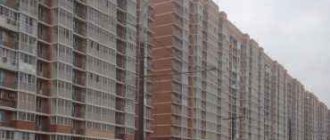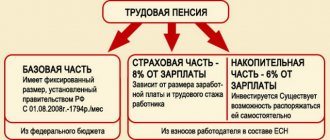Legislative regulation
The issue of providing benefits for payment for major repairs is regulated by the following legislative acts :
- Federal Law No. 399;
- Federal Law No. 181;
- Article 169 of the Housing Code of the Russian Federation.
In addition, we should not forget about the Decree of the Government of the Russian Federation itself, which guarantees the receipt of benefits on the issue of preferential payment for housing and communal services for specific categories of citizens.
Who should pay and who shouldn't?
The legislation provides for cases in which contributions for major repairs may not be paid.
But there are not many of them, let’s look at the payments: are they universally mandatory?
Nature of fees: can I refuse?
The Housing Code of the Russian Federation makes it clear that the maintenance of housing, as well as its repairs, must be carried out in full at the expense of the owner.
“Owners of premises in an apartment building are required to pay monthly contributions for major repairs of common property in an apartment building, with the exception of cases provided for in Part 2 of this article, Part 8 of Article 170 and Part 5 of Article 181 of this Code, in the amount established in accordance with Part 8.1 Article 156 of this Code, or, if the corresponding decision is made by the general meeting of owners of premises in an apartment building, in a larger amount.” (Part 1 of Article 169 of the RF Housing Code)
Considering that most apartment buildings today are in unsatisfactory condition, their renovation will be expensive for residents.
However, the state does not oblige you to spend large sums on a monthly basis for these purposes. The legislation provides for payments established based on the minimum standard of payment per square meter of area.
The tenant of a social apartment is not required to pay fees, as he is not the owner of the premises.
It is therefore worth considering carefully whether social housing should be privatized or not.
But many owners do not want to give this amount. So, what are the grounds for non-payment?
Residential buildings that do not pay receipts
There are several cases where you can avoid paying the fee for an entire apartment building.
The main ones are defined by Part 2 of Article 169 of the Housing Code:
- the building is in disrepair and is subject to demolition (payment without major repairs will not be made in the future);
- houses located on land seized for state and municipal purposes.
Residents of a new building can have a deferment of up to 5 years (read more at the link).
Lawyers name several other ways permitted by the legislator to avoid fulfilling this obligation:
- 50% of the funds from the minimum level determined by the regional standard (Part 8 of Article 170) have been collected in a special account;
- The regional fund can count against the future payment period repairs already carried out if they were included in the plan.
Certain categories of owners
The state exempts some citizens from paying for the fund's services. Various types of payment benefits are available:
- pensioners who have reached the age of 80, living alone or in a family consisting of disabled persons, have the right to full state compensation;
- non-working citizens of retirement age have a 50% discount;
- disabled people and families with disabled children;
- low-income residents;
- residents with many children or single-parent families depending on income;
- other population groups specified in the regulatory legal acts of the constituent entities of the country.
All of the above options allow you to legally issue a waiver of payment for major repairs.
Some beneficiaries must pay receipts in full. And the authorities transfer monthly compensation to their bank accounts.
What does this benefit mean?
Major renovation – what does it include? This question is asked by many citizens of our country. By and large, almost everything.
For the bill received as a result of deductions, residents of an apartment building have every right to :
- carry out not only repairs, but also insulation of the facade;
- repair balconies and loggias, including glazing them;
- replace window and balcony fillings with soundproofing ones;
- not only replace, but also repair the drain;
- repair fire escapes;
- repair the foundation, including the basement itself;
- replace and repair the roof;
- put the entrance to the entrance in complete order: replace the front door, arrange staircases.
In addition, the payment for major repairs also includes repairs:
- centralized heating;
- water supply;
- garbage chute;
- replacing electrical wiring around the house;
- elevators;
- intra-house gas supply;
- sewerage around the house.
Determining the amount of payment for major repairs
Tariffs for contributions for major repairs are approved by the Government of the constituent entity of the Russian Federation.
For example, in the Novosibirsk region from January 1, 2020 it is 7.05 rubles per 1 sq.m. housing, in St. Petersburg this amount is 7.20 rubles per 1 sq.m., and in the Samara region 5.67 rubles per 1 sq.m. for houses up to five floors inclusive and 6.52 rubles per 1 sq.m. for houses above five floors.
But at the same time, it is necessary to remember a small nuance: this size can be increased at the initiative of the residents of each particular house. If they express their desire to increase the equity of their home , then the monthly payment amount automatically increases.
It is worth keeping in mind that the amount of payment does not depend on how many apartments are in each individual building; the amount is divided equally between all residents.
Do I need to pay for major repairs?
Any building or structure periodically needs repairs, the same rule applies to apartment buildings. In order to partially eliminate the general wear and tear of the house and prevent its deterioration, it is necessary to periodically carry out major repairs of all systems and common areas of the house.
The cost of these activities is high, so residents pay a small amount each month, which accumulates in a certain account. It is difficult to control how money is spent from this account and the necessary work is carried out, so many apartment owners wonder whether it is possible not to pay for major repairs. We will answer this and other questions that relate to the major renovation of apartment buildings in our article.
Who is eligible for this benefit?
The benefits themselves are provided in the form of a discount from the social norm of payment for the provision of utility services.
It is necessary to understand that the size of the benefit directly depends on the category of beneficiaries .
The greatest benefits in this matter are:
- military citizens;
- citizens who have the status of WWII veterans;
- disabled war veterans;
- citizens who took part in the liquidation of the Chernobyl disaster;
- citizens who took part in atomic weapons tests at the Semipalatinsk test site.
50% discount on payment for major repairs is provided . The remaining 50% is paid for from public funds.
It is also necessary to take into account the fact that labor veterans are classified as WWII participants and therefore also have the right to receive a 50% discount.
If we talk about the category of large families, then they have the right to count on a 30% discount . Single pensioners who are not working and whose age exceeds 80 years can qualify for a 100% benefit.
The amount of the benefit is calculated from the amount of the minimum level , which is established in each specific region separately.
If, during a meeting of residents of any of the houses, a decision was made to increase the amount of fees for home repairs, then the benefit is provided only in the amount that was adopted by the local government. In simple words, the decision at the meeting is voluntary, so the authorities do not have the right to take such nuances into account when calculating the discount.
It is also necessary to take into account the fact that the amount itself for paying for major repairs can be reduced without a discount on the basis that there is a household that brings a stable monthly income. An example of this is: underground parking, shops (rent) and so on.
Rules and procedure for registration
The process of applying for and receiving benefits for paying for major repairs is regulated by the Housing Code of the Russian Federation .
To receive a discount, preferential categories of citizens must :
- Make sure that the specific house where the beneficiary lives is registered in the state capital repair program in the Department of Construction of the region where the beneficiary lives. It is necessary to take into account that the house may be registered with other service companies on this issue; you can ask your neighbors about this.
- Pay off all existing debts for utility services, since if they are available, the benefit is not provided, this is contrary to the legislation of the Russian Federation.
- After 8 months after the program is approved, you need to receive the 1st receipt for payment for major repairs and pay accordingly.
- You must contact the multifunctional center of the region where the beneficiary lives with a payment receipt. In addition to the receipt, you must additionally collect a certain list of documents.
It is necessary to take into account the fact that the process of considering an application for benefits can last no more than 10 days from the moment MFC the relevant documents.
In addition to the MFC, each beneficiary has the right to submit the entire list of documents via the Internet.
To do this, you need to use the State Services website .
In the event that the beneficiary does not have a personal account, it is necessary to go through the registration process and wait for confirmation of identity (within 5 days, information about the registered person is checked, and then you can log into your personal account).
On the portal, you just need to upload the necessary documents to the section that is responsible for issuing benefits for major repairs, and wait for the decision.
How to legally avoid paying for major repairs in 2020
Even taking into account the circumstances discussed above, there is a very real possibility of refusing to pay for major repairs of an apartment building and, moreover, on completely legal grounds.
At the same time, refusal to pay for major repairs does not imply zero costs, but can ensure their significant reduction.
- Tenants to help
If the owner of an apartment rents out his home, he can shift the responsibility of paying for major repairs to the tenants. The latter currently live in the house, and, therefore, it is they who are interested in providing comfortable living conditions.
- Advertising banners
The most popular way to reduce the cost of major repairs to nothing is to place advertising banners on the facade of the house. Income from this type of activity finances the capital repair fund without affecting the family budgets of the residents.
The latter option is convenient, but is appropriate only in large cities, in houses located in areas with high traffic.
- Disabled people
The Law “On Social Protection of Disabled Persons” establishes that disabled people of groups I and II, disabled children, and citizens with disabled children are provided with compensation for the costs of paying a contribution for major repairs of common property in an apartment building, but not more than 50%.
- Veterans
Federal legislation provides disabled war veterans, WWII participants, and combat veterans with compensation for capital repairs in the amount of no more than 50%.
- Chernobyl victims
Citizens exposed to radiation as a result of the Chernobyl disaster are also provided with compensation in the amount of 50% towards the payment of contributions for major repairs.
- Regional benefits
Regional authorities are given the right to establish their own benefits for paying for capital repairs. This right is successfully used by many subjects of the country. For example, providing a discount to home front workers, labor veterans, repressed and rehabilitated persons and other categories. The overwhelming number of regions have established compensation for pensioners over 70 years of age, and pensioners over 80 are completely exempt from paying contributions for major repairs. To clarify regional benefits, you should contact the social protection authorities, the MFC or the administration.
Other methods of refusing to pay funds for major repairs are considered illegal and may entail administrative penalties in the form of penalties and fines.
Who has benefits for paying contributions?
As noted above, tenants of premises, as well as residents of dilapidated houses and those houses that will be confiscated by the state, do not have to pay for major repairs. However, in these cases there are no actual benefits - the local administration pays for municipal housing, and there is no need to repair the house being demolished.
In addition, there are several other categories of owners who are exempt from paying contributions. These are the owners of apartments in the following buildings:
- for which the minimum amount planned for major repairs has already been collected;
- which are not included in the regional overhaul program;
- new buildings for a maximum of 5 years after the house is put into operation (the period is set by the regions, often it is only a few months. You can read more in our material).
However, some categories of the population still have benefits in paying contributions for major repairs. These are the following categories of owners:
- disabled people of groups I and II, as well as families with disabled children;
- low-income citizens and families (payment of contributions for major repairs is included in the amount of utility costs, which is calculated when calculating the subsidy);
- veterans and participants of the Great Patriotic War;
- labor veterans;
- rehabilitated victims of repression;
- received radiation exposure;
- large families;
- non-working pensioners and families of pensioners over 70 years of age (50% compensation) and over 80 years of age (100% compensation).
It is worth considering that for almost all categories of beneficiaries, compensation must be provided for by the legislation of the constituent entity of the Russian Federation. In some regions, unfortunately, there are still problems with the legal registration of such benefits. Federal beneficiaries are WWII veterans and disabled people.
It is important to distinguish between exemption from payment of contributions and the right to receive compensation. For houses for which owners are exempt from paying contributions, they have the right not to pay them. For beneficiaries, payment of contributions is mandatory, but subsequently they receive from the budget a certain share of the amount paid (or a subsidy, like the poor).
To apply for compensation for contributions for major repairs, you need to contact the local administration (department of social protection of the population, housing department or another) and provide the following documents:
- application in the prescribed form (department employees will help you draw it up);
- passports of home owners and people living with them;
- confirmation of entitlement to benefits (veteran’s certificate, disability certificate, etc.);
- receipts for payment of contributions (up to the time of application);
- an extract from the house register or a certificate of family composition;
- certificate of absence of debt for utility services;
- to obtain low-income status - relevant documents (income certificates, receipts for payment of all housing and communal services, etc.).
You can also submit an application to the MFC at your place of residence or through the State Services portal.
Additionally, it is worth noting that for regional beneficiaries, compensation can only be calculated for the standard area (36 square meters per person or 54 square meters per family).
You can find out more precisely whether a particular person is entitled to compensation for contributions for major repairs, and if so, in what amount, as well as a list of documents for registration, you can visit the nearest MFC or the relevant department of the municipal administration at your place of residence.
Those who are not beneficiaries, but still do not have to pay for major repairs
1) The law imposes the obligation to pay contributions for major repairs only on the owners of residential premises. Therefore, contributions cannot be charged to someone who is simply registered in an apartment without being its owner, as well as to residents of non-privatized apartments. Please note that as soon as ownership of the property is terminated (for example, the apartment is sold or donated), the responsibility to pay for major repairs passes to the new owner.
This also applies to debts: if the previous owner did not pay for major repairs, then the new owner will have to pay off the debt. This rule applies only to contributions for major repairs (Part 3 of Article 158 of the Housing Code of the Russian Federation).
Therefore, before buying an apartment, be sure to check whether the seller has any debts on these fees - otherwise you will have to pay them.
2) The Housing Code of the Russian Federation exempts owners of apartments in a building that is recognized as unsafe or located on a land plot seized for state needs from paying for major repairs. At the same time, the owners are refunded the contributions for major repairs that they paid before.
3) Regions are allowed to exempt small houses with less than 5 apartments from paying for major repairs. All contributions that owners of apartments in such buildings previously paid are subject to refund.
4) For those who purchased an apartment in a new building, there is a certain period of exemption from contributions for major repairs.
The fact is that new buildings are included in the overhaul program only after the expiration of the period determined by the regional authorities (the Housing Code sets only its upper limit - 5 years).
For example, in the Nizhny Novgorod region, the period of exemption from fees for major repairs of new buildings is the same 5 years from the date of inclusion of the house in the regional capital repair program, and in the Sverdlovsk region - 3 years.
Documentation
Download a sample application for a discount on payment for housing and communal services.
To receive a discount on major repairs, you must prepare the following documents :
- copy and original of the applicant’s passport;
- application for benefits;
- utility payment book;
- original receipt for payment for major repairs;
- a certificate from housing and communal services, which confirms the absence of debts on utility bills;
- single housing document;
- original extract from the house register;
- a beneficiary's certificate, which confirms the possibility of receiving benefits for this type of payment.
It is worth noting that documents can be submitted personally by the applicant or through an authorized representative, but this requires a notarized power of attorney.
Regional features
Let's look at the benefits for paying for the capital region in some regions of our country.
Khabarovsk region
Since July 2020, a regional bill has been adopted according to which:
- pensioners who have benefits for housing and communal services, over the age of 70, pay this fee in the amount of 50%;
- Citizens over 80 years of age are completely exempt from this payment.
Moscow region
In this region there is a discount that allows you to pay only 7.5 rubles for the capital size. per meter of living space.
This discount applies to all categories of beneficiaries.
Saint Petersburg
In this region, beneficiaries make a monthly payment for each meter of living space in the amount of 2 rubles.
At the same time, citizens over 80 years of age are completely exempt from payments.
Novosibirsk
For citizens of apartment buildings, a discount is provided for beneficiaries, which allows them to pay in the amount of 3.05 rubles. for every meter of your living space.
It is also necessary to take into account the fact that all beneficiaries at the federal level can take advantage of this discount.
Nizhny Novgorod
In this region, the preferential category of citizens makes a monthly payment for major repairs in the amount of 3.15 per meter of living space.
As you can see, each region of the Russian Federation provides its own regional discounts for paying for major repairs. It is worth considering that discounts may differ for all other utility bills.
If we talk about whether there is a difference in the procedure for obtaining benefits, then there is no difference. The entire procedure is completely the same, as is the list of required documents.
That is why it is necessary to find out about the size of the discount in each region of residence separately . This can be done by contacting either the housing and communal services department, or directly to the multifunctional center itself, which operates in a specific region.
What happens if you don’t pay for major repairs?
Despite all the dissatisfaction with the current system, one should understand the consequences of non-payment of contributions. Like any debts, failure to pay for major repairs leads to the accrual of penalties and further forced collection (Part 14.1 of Article 155 of the Housing Code specifies how payments for housing and utilities are made).
In case of prolonged and systematic violation of the payment schedule, for example, if there is a delay of more than 6 months, legal proceedings are possible . As a result, bank accounts will be blocked until the debt and legal costs are fully repaid.
Since June 1, 2016, a simplified method of collecting debts for housing and utilities has been in effect if the debt amount is within 500 thousand rubles. Then TSN representatives apply to the courts at the debtor’s place of residence. In court, based on the documents provided and without summoning the parties, a court order is issued within up to 5 days. This means that the debtor is often deprived of the opportunity to learn about the court hearing and attend it.
Those debtors who voluntarily do not pay the required amount will be contacted by bailiffs who can seize property (cars, real estate) and prohibit travel outside the country .
In turn, the case with the bailiffs becomes available for inspection by banking organizations, which may refuse to issue a consumer loan or mortgage to an insolvent citizen.
In extreme cases, the defaulter faces eviction , however, the law prohibits the use of such measures against citizens whose debt arose while having only one home (Article 446 of the Civil Code specifies property that is not subject to collection under a writ of execution).
If you are determined not to pay for major repairs, then you can deprivatize the apartment, that is, return it to the state. Then the obligation to pay will pass to the new owner, but you will lose the right to dispose of this property, donate, sell, bequeath.
Who makes payments for major repairs if the apartment is rented?
Under the rental agreement, the tenant pays the current costs of maintaining the common property and local area, and therefore is not obliged to make contributions for major repairs instead of the owner.
How not to pay for major repairs legally
The legislation provides for a 50% discount on payment for major repairs, which is provided to:
- owners who are over 70 years old if they live alone or in a family consisting of non-working pensioners;
- disabled children and their parents, disabled people of groups I and II;
- liquidators of accidents at Chernobyl and other nuclear power plants;
- labor veterans, combat veterans;
- other categories of citizens in accordance with regional legislation.
- A number of categories of citizens receive 100% benefits and are completely exempt from paying contributions. Here's who won't pay for major repairs:
- residents of dilapidated houses that are subject to demolition;
- owners of apartments that will be seized for the needs of the state - in accordance with Part 2 of Art. 169 Housing Code of the Russian Federation;
- owners aged 80 years or more who live in the apartment themselves - under Art. 169 Housing Code of the Russian Federation;
- WWII veterans.
To take advantage of the benefits provided, you need to submit an application and provide documents confirming this right. At the time of registration of the benefit, the owner must be registered, live at the specified address and pay off all debts for the apartment.
If you do not belong to one of the preferential categories, the only way to legally avoid paying contributions for major repairs is deprivatization of housing, in which the property becomes the property of the state. At the same time, you transfer not only the right of ownership, but also the responsibilities that come with it, while simultaneously losing your home. Therefore, this practice is not used, but it is worth knowing about its existence.
What subsidies are provided for low-income citizens?
In addition, compensation is provided for citizens whose utility costs exceed the maximum allowable amount in the joint family income (Article 159 of the Housing Code contains information on the registration of subsidies for housing and utilities). The possible portion of utility bills is determined by regional authorities; usually it is 18-20% of the family budget.
In this case, there is a declarative procedure for reducing or canceling payments, that is, citizens themselves must take care of making changes to the accounting information of TSN or Criminal Code. If there are benefits, residents pay for the service in full, and then they are compensated for the amount due.
It is necessary to timely submit an application for cancellation of payment for major repairs when legal grounds for this arise. If you are delayed in completing the documents, the transferred funds will not be returned.
To some extent, you can compensate for the costs of maintaining the house and major repairs by using the facade for advertising purposes. If the house has shops and commercial organizations on the ground floors, or the location of the house allows it to interest potential advertisers.
In this case, the TSN administration manages the income received, so residents have the right to determine at a meeting what part of the collected money should be used for current needs or for major repairs.
In what cases is the payment for major repairs reduced?
You can avoid paying contributions for major repairs in cases where the housing belongs to certain categories, or when residents have benefits:
- An apartment building is considered unsafe and subject to demolition;
- The land plot under the house will be used by state or municipal authorities for their own purposes;
- Housing is classified as new buildings; if the house is new, payment deferrals are provided for from 3 to 5 years;
- Residents live on social tenancy terms and are not the owners of the apartment (according to Article 65 of the Housing Code, which defines the rights and obligations of the landlord under the social tenancy agreement);
- Single or cohabiting pensioners pay 50% upon reaching 70 years of age; upon reaching 80 years of age, they are completely exempt from payment;
- Non-working disabled people of group I or II, parents of disabled children pay 50%;
- Preferential categories of citizens by decision of the local administration (WWII and labor veterans, combat veterans, blockade survivors, liquidators of the Chernobyl accident, large families and others).
The application and documents confirming the preferential status must be submitted to the MFC, where you can pre-register through the State Services website.
What beneficiaries can expect in 2020
This year, Russian citizens included in the preferential category should not expect changes in legislation. When planning to exercise their rights, they must consider the following nuances :
- Owners of city apartments pay monthly utility bills, which include the costs of major repairs. Also, for preferential categories of citizens, money is allocated from the regional and federal budgets. Every citizen has the right to take advantage of preferences. To do this, it is necessary to collect documents and submit them to the appropriate authority, after which the officials will grant the application.
- A preference may be denied if any document is missing. In such a situation, the applicant will be given additional time to complete the package of papers.
- An individual may receive a negative answer if he provides deliberately false information, or officials decide that he has no grounds for using benefits.
About this type of benefits, see the following video:











